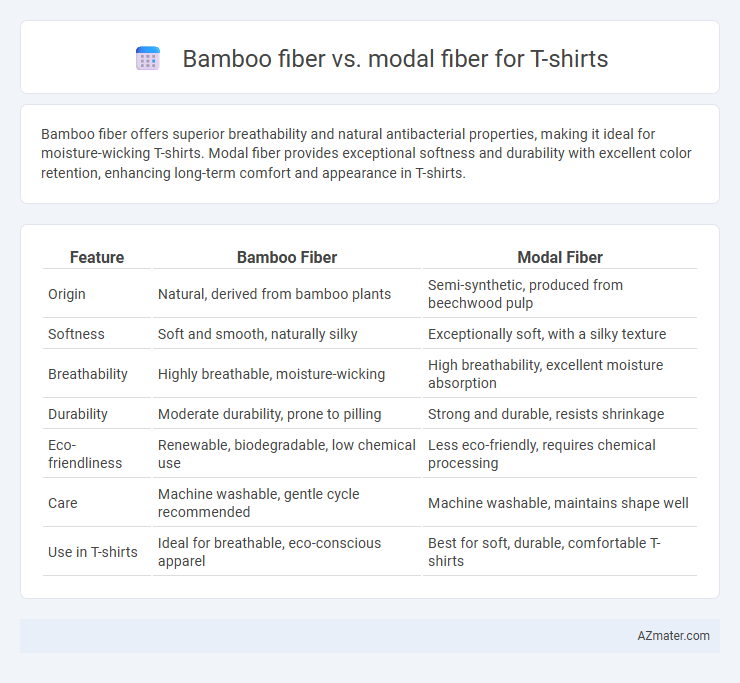Bamboo fiber offers superior breathability and natural antibacterial properties, making it ideal for moisture-wicking T-shirts. Modal fiber provides exceptional softness and durability with excellent color retention, enhancing long-term comfort and appearance in T-shirts.
Table of Comparison
| Feature | Bamboo Fiber | Modal Fiber |
|---|---|---|
| Origin | Natural, derived from bamboo plants | Semi-synthetic, produced from beechwood pulp |
| Softness | Soft and smooth, naturally silky | Exceptionally soft, with a silky texture |
| Breathability | Highly breathable, moisture-wicking | High breathability, excellent moisture absorption |
| Durability | Moderate durability, prone to pilling | Strong and durable, resists shrinkage |
| Eco-friendliness | Renewable, biodegradable, low chemical use | Less eco-friendly, requires chemical processing |
| Care | Machine washable, gentle cycle recommended | Machine washable, maintains shape well |
| Use in T-shirts | Ideal for breathable, eco-conscious apparel | Best for soft, durable, comfortable T-shirts |
Introduction to Bamboo and Modal Fibers
Bamboo fiber is derived from the pulp of bamboo grass, known for its natural antibacterial properties, moisture-wicking ability, and eco-friendly cultivation process. Modal fiber, made from beech tree cellulose, offers exceptional softness, durability, and breathability, making it a favorite in premium T-shirt manufacturing. Both fibers provide sustainable alternatives to conventional cotton, with bamboo excelling in antimicrobial benefits and modal in smooth texture and strength.
Origin and Production Processes
Bamboo fiber is derived from the pulp of bamboo grass, typically processed through mechanical or chemical methods involving enzymatic treatment or chemical solvents to break down the plant fibers into a soft, breathable yarn. Modal fiber originates from beech tree pulp and is produced using a high wet modulus process that reconstitutes the cellulose into fine, smooth fibers, offering durability and a silky texture. Both fibers undergo environmentally sensitive manufacturing techniques, with bamboo emphasizing natural enzymatic extraction and modal relying on advanced chemical spinning for enhanced fabric performance.
Environmental Impact Comparison
Bamboo fiber requires less water and pesticides compared to Modal fiber, making it a more sustainable choice for T-shirts. Modal is derived from beech trees and involves chemical-intensive processes that contribute to pollution, while bamboo cultivation is faster-growing and has a lower carbon footprint. Both fibers offer biodegradable options, but bamboo's cultivation and processing tend to have a reduced environmental impact overall.
Comfort and Softness in T-Shirts
Bamboo fiber offers exceptional breathability and moisture-wicking properties, making T-shirts incredibly soft and comfortable for all-day wear. Modal fiber is known for its silky smooth texture and excellent drape, providing a luxurious softness that enhances comfort in T-shirts. Both fibers surpass traditional cotton in softness, but bamboo's natural antibacterial qualities add an extra layer of comfort by reducing odor and irritation.
Moisture-wicking and Breathability
Bamboo fiber offers superior moisture-wicking properties due to its natural micro-gaps that absorb and evaporate sweat quickly, keeping the skin dry during physical activities. Modal fiber, derived from beech tree pulp, provides exceptional breathability and softness but retains moisture longer compared to bamboo, making it less ideal for intense workouts. Bamboo's inherent antibacterial qualities also enhance comfort by reducing odor, whereas modal is prized for its smooth texture and durability.
Durability and Longevity
Bamboo fiber demonstrates excellent durability due to its natural antimicrobial properties and resistance to stretching, ensuring T-shirts maintain shape and strength over time. Modal fiber, made from beech tree pulp, offers superior softness and breathability but is slightly less resilient under frequent washing and physical stress. Choosing bamboo fiber T-shirts provides enhanced longevity, while modal blends may require gentler care to preserve durability.
Hypoallergenic and Skin-friendliness
Bamboo fiber's natural antibacterial and moisture-wicking properties make it highly hypoallergenic and gentle on sensitive skin, reducing irritation and allergies in T-shirt wearers. Modal fiber, derived from beech tree pulp, offers a silky smooth texture and excellent breathability, promoting skin comfort and minimizing allergic reactions. Both fibers excel in skin-friendliness, but bamboo fiber's inherent antimicrobial qualities give it an edge for those with sensitive or allergy-prone skin.
Color Retention and Dye Absorption
Bamboo fiber exhibits superior dye absorption due to its porous structure, allowing T-shirts to showcase vibrant, long-lasting colors that resist fading after multiple washes. Modal fiber provides excellent color retention with a smooth surface that holds dye molecules effectively, resulting in consistent and deep hues over time. Both fibers offer strong colorfastness, but bamboo's natural moisture-wicking properties enhance dye durability in activewear T-shirts.
Cost and Value for Consumers
Bamboo fiber T-shirts typically cost more upfront due to eco-friendly processing methods but offer superior moisture-wicking and antibacterial properties, enhancing long-term value for consumers seeking sustainability. Modal fiber shirts are generally more affordable and provide exceptional softness and durability, making them a cost-effective choice for everyday wear. Consumers balancing price and performance often choose bamboo for environmental benefits and modal for budget-friendly comfort.
Choosing the Best Fiber for T-Shirts
Bamboo fiber offers excellent breathability, natural antibacterial properties, and eco-friendly sustainability, making it ideal for moisture-wicking, comfortable T-shirts. Modal fiber provides superior softness, high durability, and resistance to shrinkage, ensuring long-lasting, smooth-textured garments. Selecting the best fiber depends on prioritizing sustainability and ventilation with bamboo or opting for durability and luxurious softness with modal.

Infographic: Bamboo fiber vs Modal fiber for T-shirt
 azmater.com
azmater.com